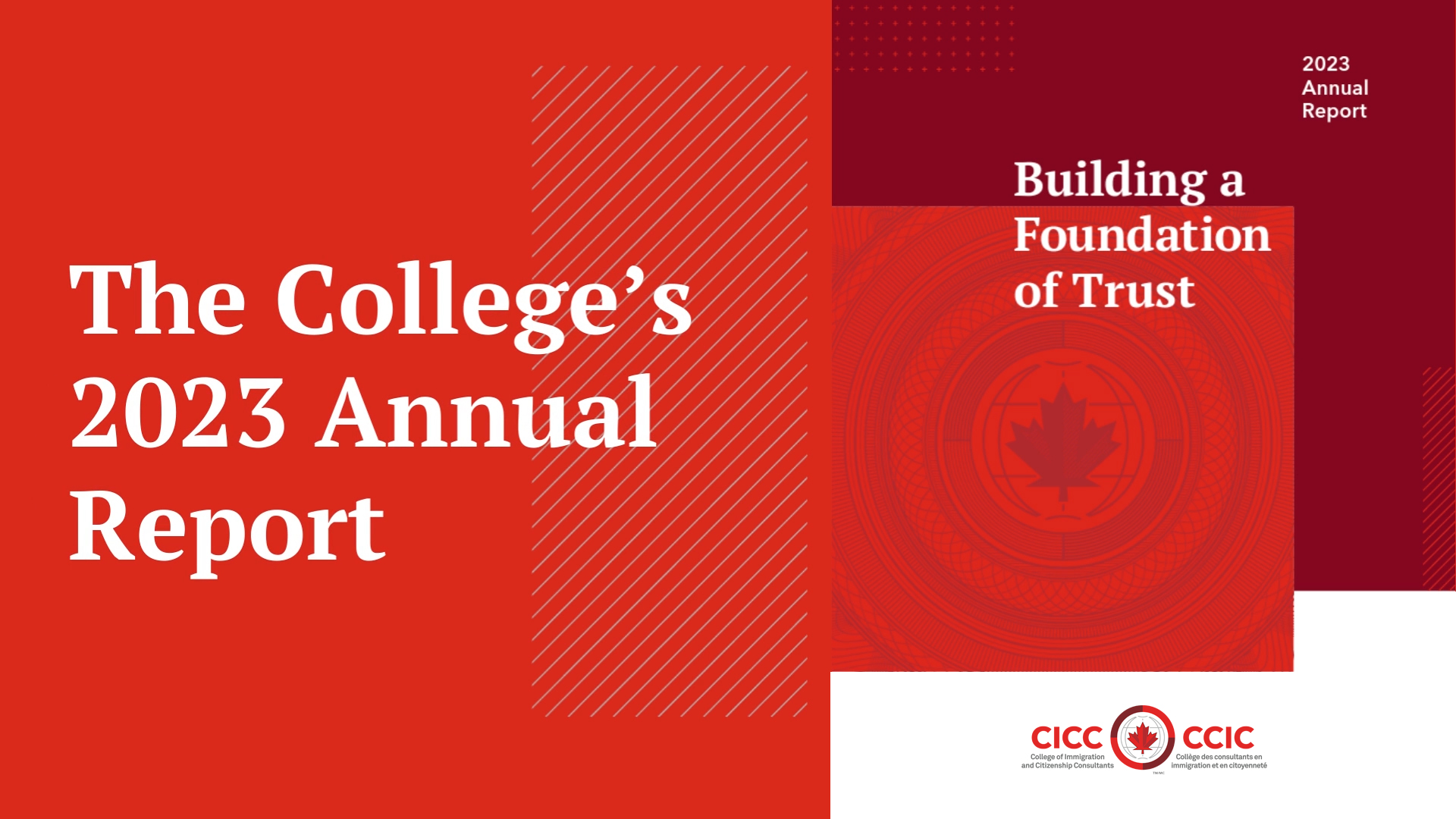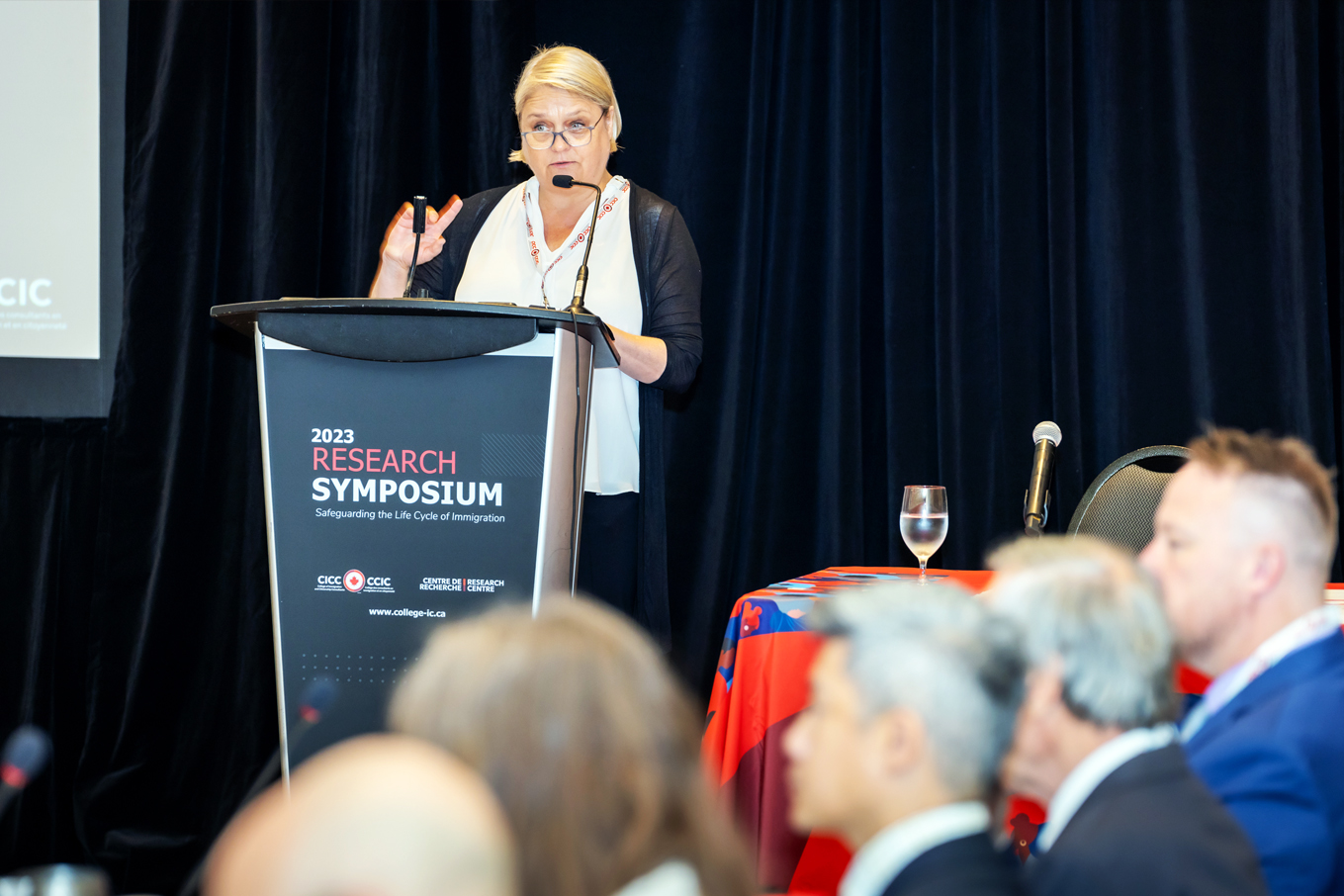
In this edition:

Board Of Directors Meeting Highlights – September 28, 2023
The College Board of Directors met on September 28, 2023. All directors attended either in person or via Zoom. Mr. Peter Christensen, Assistant Director, Social Immigration Policy and Programs and Ms. Mashal Dawkins, Policy Analyst, Immigration, Refugees and Citizenship Canada (IRCC) attended the meeting as Ministerial Observers pursuant to s. 76 of the College Act. Also in attendance was Ms. Lynn Stivaletti, CPA, CA, Goodman Mintz, LLP, auditors of the College.
The Board of Directors approved the following items of interest to licensees:
- The Annual General Meeting (AGM) of licensees (RCICs and RISIAs) will be held on November 30, 2023. The record date for the AGM is November 1, 2023. Only licensees in good standing on the record date are entitled to attend and vote at the AGM.
- The Audited Financial Statements of the College for the period July 1, 2022 – June 30, 2023.
Other items before the Board of Directors included:
- Review and discussion of recommendations contained in the Independent Complaints Review Officer’s Q4 Report on certain professional conduct activities.
- A presentation on the College Act amendments that received Royal Assent and became effective as of June 22, 2023.
- Viewing of the College Annual Report.
Full minutes of this Board meeting will be posted on the College website upon approval by the Board at its next meeting on November 30, 2023.
Note that College Board meetings are open to the public and licensees who wish to observe.

2023 College Annual Report available now
Copies will also be available at the Annual General Meeting.
Titled “Building a Foundation of Trust”, the Annual Report includes:
- Licensee Snapshots: Updated numbers of RCICs and RISIAs worldwide
- Improving Competency: An update on how the College built on the Essential Competencies and Code of Professional Conduct already in place
- Safeguarding the Public: An in-depth look at the College’s public awareness campaigns and how licensees are regulated through compliance
- Stakeholder Relations: Key initiatives to build important relationships with key stakeholders
- July 1, 2023 – June 30, 2026 Strategic Plan: Setting the Standard for Public Protection
- Governance: Details on the Board of Directors, Committees and the Senior Management Team
- Audited Annual Financial Statements
To access the full 2023 Annual Report, please visit: https://college-ic.ca/about-the-college/annual-reports

The College’s 2023 Annual General Meeting
The College of Immigration and Citizenship Consultants will hold an annual general meeting of College licensees (AGM) on November 30, 2023, commencing at 10:00 am ET, in the City of Ottawa, Ontario.
To be eligible to attend or vote, licensees (RCICs and RISIAs) must be in good standing on November 1, 2023. To check your status, please search the Public Register found on the College website at: protecting-the-public/find-an-immigration-consultant.
A registration page will be made available on November 3, 2023, on the College website registration landing page. As in-person seating will be limited, a video link to attend virtually will be provided.
The AGM will be followed by a licensee educational event in the afternoon for which CPD credits may be earned.
A buffet lunch will be provided.

Finding the time to be more human
Written by Michael Huynh, MSc, BCL, LLB, Director, Professional Conduct of the College of Immigration and Citizenship Consultants
Carl Wurfel, RCIC-IRB and Leanne Deboski, RCIC-IRB
How much time do you spend managing difficult clients? How effectively do you manage them?
The answers reveal a great deal about the effectiveness of your current practice and your ability to adapt to coming changes in the immigration sector.
Difficult Clients
Last month in downtown Edmonton, I sat down with Carl Wurfel, RCIC-IRB, and Leanne Deboski, RCIC-IRB and delved into the topic. Before a group of over a hundred RCICs, the 3 of us shared our experiences, lessons learned, and suggestions for better managing difficult clients, their complaints, and the College complaints process.
Carl and Leanne detailed their challenging personal accounts of working with clients who consumed an inordinate amount of time, energy – both mental and emotional – and money. Unreasonable demands, delayed responses, omitted information, second-guessing the advice provided, and intimidation were but a few of the behaviours exhibited by these clients, owing to their character and circumstance.
Complications of technology
Carl and Leanne’s stories warned of how technology has changed the way RCICs add value and compete in the immigration sector. While clients still rely on your knowledge and expertise to navigate the complexities of Canada’s ever-changing immigration landscape, they also interact with online resources and social media to supplement their knowledge. Today you contend with clients who enter a consultation with their own interpretations of immigration law (correct or not), who only want help with (and to pay for) a narrow issue, and who are more confident and resolute in their immigration strategy (having already conducted their own online research).
Clients are also no longer just consumers, but drivers of demand. We heard from Carl how the same online platform used by clients to search for and obtain information – Google – is also used to review and publicize information about RCICs. Online platforms and review sites influence consumer behaviour, but there is little to no recourse for RCICs to address misinformation. We asked the licensees in the audience if they were concerned about their social media ratings (e.g., Facebook, Google Reviews): the majority (60%) said they were extremely concerned; a quarter (25%) said they were either moderately or somewhat concerned; the remaining (15%) said they were either slightly or not at all concerned.
Opportunities for improvement
When we shifted our discussion towards solutions for better managing these clients, predictably, Leanne and Carl covered the tried, tested and true recommendations of “clear service agreements”, “frequent communication throughout”, and “setting realistic timelines (both yours and IRCC’s)”.
Leanne also cited using more stringent, personalized, client screening measures, which led me to ask “what type of client would you screen out?” Carl responded, “the client that knows everything already” – the know-it-all who will not take advice. His response speaks to the importance of both understanding your client needs as well as your own professional needs. A successful client relationship requires that you take the time to assess and consider your own capabilities: under what conditions do you perform best, with what types of personalities do you have positive working relationships, which negative outcomes are you prepared to work through with a client, and what your limits are.
Technology also presents an opportunity for improvement. Automation and AI technology will undoubtedly continue to disrupt the immigration industry, with some negative impacts on professionals. The technology however can also help free up the time you otherwise devoted to tasks such as collecting information and filling out forms, enabling you to focus on the more "human" aspects of your immigration practice. These tools will also increasingly facilitate client access to more timely, accurate, and comprehensive immigration information. But the tools are not intuitive, emotional, empathetic, or culturally sensitive. RCICs who effectively leverage technology and apply these skills, attitudes, and behaviours in their advice and representation offer clients far greater value than an RCIC or an AI tool working alone.
Focusing on the "human" element of your work will help you go beyond your client’s specific immigration issues and see them as an individual. You can then better understand and manage their difficult behaviours, which can ultimately contribute to your professional success.

Payments via College Portal
The upcoming College Portal will make it quicker and easier for licensees to pay their fees by moving to a secure online payment system.
Through the College Portal, licensees will be able to pay their fees instantly as soon as they submit applications.
Automated payments on the College Portal will also help licensees track their payments and avoid missing crucial deadlines.
In addition to these features, a secure payment gateway will keep transactions data safe.
More details will be shared in the coming weeks. For regular updates, visit: https://college-ic.ca/whats-on/college-portal.

Inaugural Research Symposium
Our inaugural Research Symposium, held on October 6, 2023, brought together a diverse group of industry experts, advocates and thought leaders from within Canada, Australia and New Zealand to discuss the evolving landscape of immigration and its regulatory affairs.
At the event, we discussed topics such as integrating Canada’s global talent, the impact of science and collaboration on the integrity of the regulatory system, migration governance and the challenges of data maximization. The dialogues and insights from the symposium form the blueprint for positive change as we strive to safeguard the life cycle of immigration.
John Murray, President & CEO of the College of Immigration and Citizenship Consultants, said: “We are optimistic about the meaningful changes, collaborative partnerships and actionable solutions that have emerged from our inaugural symposium. Our approach is rooted in value-based regulation, with the public’s interest at the forefront.”
Thank you to all who contributed to the symposium’s success. Your unique perspectives and expertise formed the bedrock of our shared commitments. We look forward to the continued collaboration and the positive impact of our efforts.
Visit the College’s Facebook page to see pictures and more from the Research Symposium.

Human Cost of Job Selling in Canada’s Immigration Landscape
Contributions by RCICs Kim K.C. Ly, Maria Shtemberg, and Cobus Kriek
Canada’s allure as a prime immigration destination is undeniable. The economic and social appeal draws millions each year and the array of immigration pathways makes Canada an attractive option for those seeking a new life. This attractiveness comes with a dark side – the widespread and damaging practice of job selling in employment-based immigration fraud. According to Cobus Kriek, a Regulated Canadian Immigration Consultant (RCIC), “job selling is a cultural problem”.
Job selling refers to situations where foreign nationals, often migrant workers, pay substantial sums for promised employment opportunities in Canada. These opportunities serve as a means to secure temporary or permanent resident status. This illegal pathway preys on vulnerable individuals who lack knowledge of the Canadian immigration process and who grow increasingly desperate to relocate.
Unethical licensees and unauthorized practitioners can exploit the vulnerabilities of immigration hopefuls, extracting thousands of dollars for jobs that may not exist or are not as advertised. This type of employment-based fraud has a negative impact on the Canadian economy.
The situation often worsens when false recruitment agents or employers resort to threats and intimidation, including confiscating documents or passports. Unfamiliar with Canadian law, migrants become dependent on these agents. A case in point is Eliza Lazaro, who came to Canada as a live-in caregiver and posed as an immigration consultant. She fraudulently lured and exploited hopefuls to Canada as caregivers, forging paperwork and staging fake employers for 5 years. When apprehended, Lazaro received an 11-month prison sentence and a $23,500 fine by the Ontario Court of Justice.
Kim Ly, a licensed immigration consultant, emphasizes that “these foreign workers face additional barriers in Canada such as language, culture, customs and discrimination.” She also noted that Canada’s immigration policies inadvertently play a role by favouring those with Canadian work experience and job offers. This pushes foreign nationals, who Ly referred to as “economic refugees”, to do whatever it takes to gain this experience, often resorting to buying job offers from unauthorized practitioners.
A typical scenario involves international graduates racing against time to gain sufficient Canadian experience for permanent residence eligibility, or Post-Graduation Work Permit (PGWP) holders working for Canadian employers with insufficient Comprehensive Ranking System (CRS) scores. As a result, some immigrants resort to buying Labour Market Impact Assessments (LMIAs) to gain the additional points required to increase CRS scores.
It is crucial for immigrants to understand that they should never pay to get a job in Canada. Employers, in fact, pay recruiters and sponsor LMIAs to find suitable candidates for vacant roles. Sadly, some immigrants willingly and ignorantly participate in these frauds, paying exorbitant amounts – up to $75,000 as noted by Cobus Kriek – to secure jobs for continued residence in Canada. Kriek has been vocal about this and reiterates the urgency of treating unscrupulous agents as organized criminals by the government.
Ethical and law-abiding immigration consultants play a vital role in Canada’s immigration landscape, ensuring that aspiring immigrants are well-informed, protected and guided through the complexities of the process. By abiding by the College’s Code of Professional Conduct, these consultants not only safeguard the interests of their clients but uphold the integrity of Canada’s immigration system.
The College’s mission is clear: to license and regulate Canadian immigration and citizenship consultants in the public interest. Benchmarking service standards helps elevate the credibility of licensees and gives assurance to the public that their rights are being protected by the Canadian government. Through commitment to ethical practices, licensees contribute to elevating the credibility of the profession.
Immigrants are reminded that they are not alone on their immigration journey. RCICs and Regulated International Student Immigration Advisors (RISIAs) are held to high educational, ethical, competency and professional standards by the College and are available to help.
To find or verify the status of a licensed immigration consultant, visit our Public Register – www.bit.ly/PublicRegister.

Keep Your Contact Information Updated
Licensees are provided with important, up-to-date
information via the contact information provided to the College. If your
details change, please update your contact information as soon as possible via info@college-ic.ca.

The College is looking for some talented professionals to join our team.
Do you or someone you know want to be part of a team that protects the public by overseeing regulated immigration and citizenship consultants and international student advisors?
Interested in any of these opportunities? Submit your resume and a brief cover letter indicating why you feel you are a fit for the role.
For more information on these positions and the most up-to-date College career postings, visit the College's Career page.